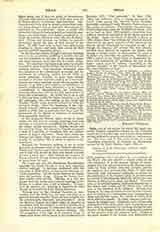

Cella, one of the names by which the small memorial chapels sometimes erected in the Christian cemeteries of the first age were known; these edifices are also referred to as memorise martyrum, confessions, etc. The term Cella in this sense occurs in a very interesting inscription of Caesarea in Mauretania quoted by De Rossi (Bullet., April, 1864):—
AREAM AT [AD] SEPULCHRA CULTOR VERBI
CONTULIT,
ET CELLAM STRUXIT SUIS CUNCTIS SUMPTIBUS.
[This cemetery (area) was given by a worshipper of the Word, who also erected a chapel (Cella) at his own expense.] It is the general opinion of archaeologists that the edifices erected in the Roman cemeteries by Pope Fabian (236-250) [Multas fabricas per cymeteria fieri praecepit (Lib. Pont., I, 148)] were memorial cellae constructed primarily as places for the celebration of the funeral agapae or anniversaries by friends of the deceased, when the oblatio pro dormitione, or Mass for the dead, was offered. Two such cellae, or cemeterial basilicas, dedicated respectively to Sts. Sixtus and Cecilia and St. Soter, may still be seen in the cemetery of St. Callistus. In form they belong to the class of edifices known as cellos trichorce, each consisting of a rectangular nave terminating in three semicircular apses, the chords of which form three sides of a square. In other instances cellae terminate in a single apse. Originally each of these cellae consisted of three apses alone which probably served as a choir or sanctuary for the clergy during the celebration of the liturgy, while the congregation assisted at the services from the adjacent lawn. Owing to the great respect of the Roman civil authorities for places of interment, it is conjectured that, except in the more rigorous persecutions, the Christians may have sometimes held their regular Sunday liturgical services in the manner described, under the pretext of memorial services for the dead.
MAURICE M. HASSETT

